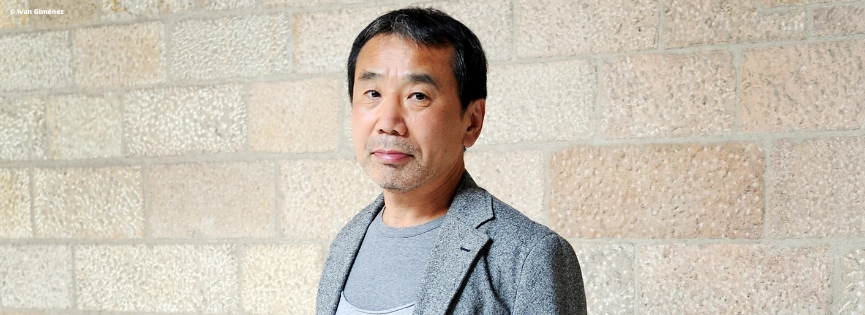You are in:
Laureates
Start of main content
Haruki Murakami
Princess of Asturias Award for Literature 2023

Writer and translator Haruki Murakami was born in Kyoto (Japan) on 12th January 1949. A graduate in Literature from Waseda University and lover of crime novels, at the start of his literary career he ran a jazz club, music being a decisive element that runs throughout his work, in which the everyday world of modern Japan and references to pop culture converge.
A cult author who has been translated into more than forty languages, according to specialists Murakami is an unnerving writer, with a prose that reveals the influences of authors such as Dostoyevsky, Dickens, Capote and Vargas Llosa (1986 Prince of Asturias Laureate for Literature). He employs an intimate tone –at times surrealistic and with traces of humour and suspension of belief– which does not avoid, but rather confronts the most serious social problems and the fight to defend essential human values, while insisting on the desire for love and feeling of loneliness of his characters, who survive in between the real and the dreamlike world, between constant certainty and uncertainty. His first novel, Kaze no uta wo kike (1979) (Hear the Wind Sing, 1987), awarded the Gunzou Literature Prize for budding writers, gave rise to the so-called Trilogy of the Rat, which continues with 1973-nen no pinbōru (1980) (Pinball, 1973, 1985) and Hitsuji wo meguru bōken (1982) (A Wild Sheep Chase, 1989), which earned Murakami the Noma Literary New Face Prize. He is also the author of Sekai no owari to hādoboirudo wandārando (1985) (Hard-Boiled Wonderland and the End of the World, 1991), Dansu dansu dansu (1988) (Dance Dance Dance, 1994), Kokkyō no minami, taiyō no nishi (1992) (South of the Border, West of the Sun, 2000) and the collections of stories Zō no shōmetsu (1993) (The Elephant Vanishes, 1993), Kami no kodomo-tachi ha mina odoru (2000) (After the Quake, 2002), Mekurayanagi to nemuru onna (2006) (Blind Willow, Sleeping Woman, 2006), Onna no inai otokotachi (2014) (Men without Women, 2017) and Ichininsho tansu (2020) (First Person Singular, 2021). He garnered publishing success in 1987 with Noruwei no mori, a title taken from the Beatles song Norwegian Wood, which sold ten million copies in his country and was translated into 36 languages. He moved to the United States in 1991, where he was a writing fellow at Princeton University and Taft University. He wrote Nejimaki-dori kuronikuru in 1995 (The Wind-Up Bird Chronicle, 1997). That same year, following the earthquake in Kobe, a city where he had lived as a child, and the sarin gas attack in the Tokyo subway, Murakami returned to Japan to interview victims as well as members of the Aum Shinrikyō religious sect, responsible for the attack. The result of these conversations is the nonfiction work Andāguraundo (1998) (Underground, 2000), which won the Kuwabara Takeo Academic Award (Japan). Since then, he has published Supūtoniku no koibito (1999) (Sputnik Sweetheart, 2001), Umibe no Kafuka (2002) (Kafka on the Shore, 2005) and Afutā Dāku (2004) (After Dark, 2007). The collection of stories Blind Willow, Sleeping Woman won him the Frank O’Connor International Short Story Award (Ireland). His latest novels include Ichi-kyu-hachi-yon (2009) (1Q84, 2011), Shikisai wo motanai Tazaki Tsukuru to, Kare no Junrei no Toshi (Colorless Tsukuru Tazaki and His Years of Pilgrimage, 2014) and Kishidancho Goroshi (2017) (Killing Commendatore, 2018). Not yet translated into English, this year (2023) he has published Machi to sono futashika na kabe (The City and Its Uncertain Walls) in Japan. He has translated Raymond Carver, Francis Scott Fitzgerald, Truman Capote, JD Salinger, and John Irving.
Holder of the Yomiuri Prize (Japan, 1996) and the World Fantasy Award (USA, 2006), he has also received the Asahi Prize (Japan, 2006), the Franz Kafka Prize (Czech Republic, 2006), the Jerusalem Prize (Israel, 2009), the 23rd International Catalonia Prize (2011) and the Hans Christian Andersen Literature Award (Denmark, 2016), among others. He has been distinguished with the Order of Arts and Letters by the Spanish Government (2009).
End of main content
Sección de utilidades
Fin de la sección de utilidades
- Legal document Legal document (Access key 8)
- | Privacy policy Privacy policy (Access key )
- | Social networks ???en.portal.pie.menu107.title???
- | Cookies ???en.portal.pie.menu110.title???
- | Site map Site Map (Access key 3)
- | Contact Contact (Access key )
- | XHTML 1.0
- | CSS 2.1
- | WAI 'AA
© Copyright 2024. FUNDACIÓN PRINCESA DE ASTURIAS
 MINUTES OF THE JURY
MINUTES OF THE JURY


